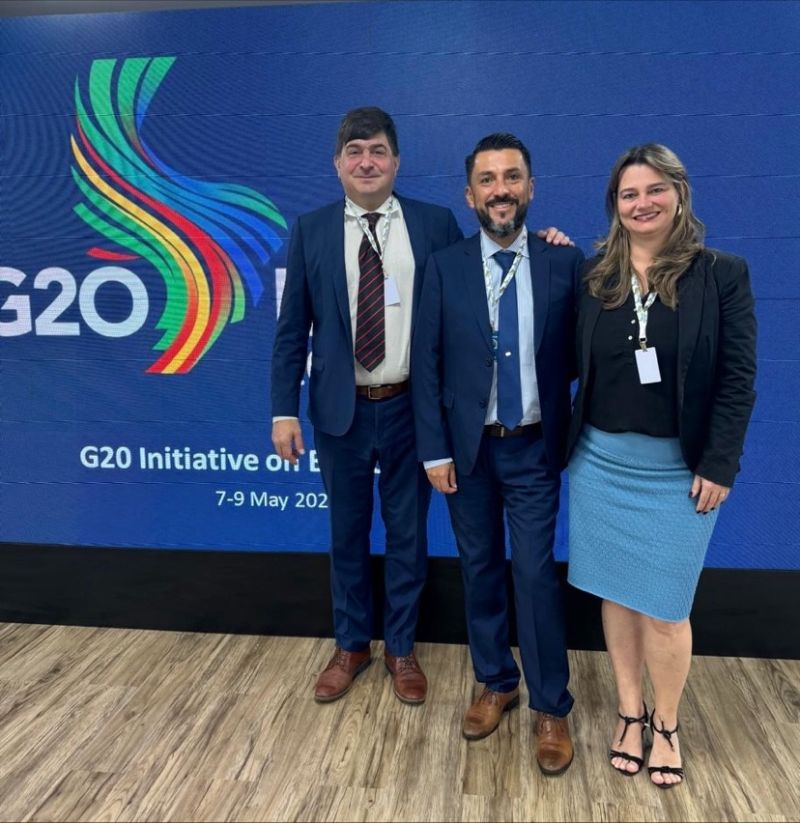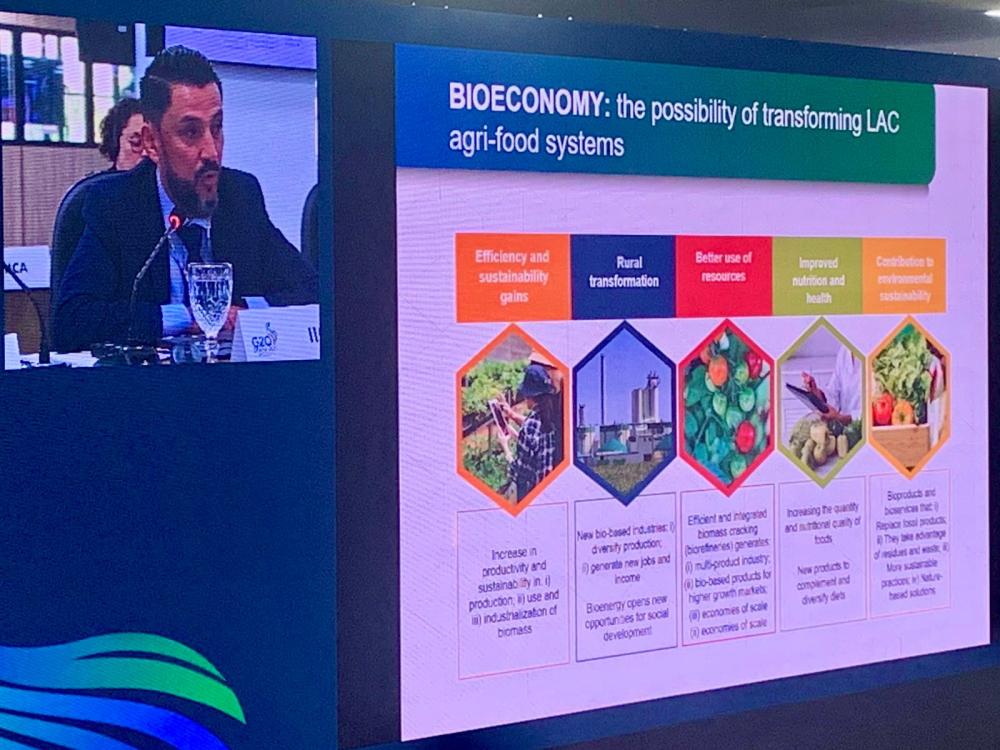The voices and vision of Latin America and the Caribbean, amplified by IICA, were present at the first meeting of the G20 Global Bioeconomy Initiative chaired by Brazil

Brasilia, 16 May 2024 (IICA) – With the mission of making the voice and point of view of the countries of Latin America and the Caribbean heard and of strengthening alliances and collaboration between the region and industrialized nations, the Inter-American Institute for Cooperation on Agriculture (IICA) participated in the first meeting of the G20 Global Bioeconomy Initiative in Brasilia.
The G20 or Group of Twenty –considered the main forum for international cooperation– brings together the countries with the largest economies in the world to discuss political, economic and social initiatives. Argentina, Brazil, Canada, the United States and Mexico are the countries of the Americas that are members of the G20.
The presidency is held during 2024 by Brazil, and this country included the bioeconomy as one of the topics on the agenda creating a working group to which IICA was invited as a reference organization in the Western Hemisphere in promoting the bioeconomy as a driving force for sustainable development. Another of IICA’s work priorities for this year is to influence the G20 agricultural agenda.
As the official documents mention, unlike other topics traditionally discussed at the G20, the bioeconomy did not yet have a clearly defined international forum for debate. Through the G20 Global Initiative on Bioeconomy, member countries and IICA and other invited international organizations are expected to discuss and agree on the guiding principles of the bioeconomy to subsequently build joint working agendas.
Although there is no multilaterally agreed definition, the bioeconomy can be understood as a knowledge-based development model, encompassing both new and old technologies and traditional knowledge, which is key to environmental protection.
The launch of the initiative by Brazil is based on the same premise on which IICA has been developing an intense work plan for several years: that the bioeconomy is a new development paradigm that promotes economic growth while fostering social inclusion and environmental sustainability.
Along these lines, dialogue and collective construction at the G20 revolve around three thematic areas: research, development and innovation for the bioeconomy; sustainable use of biodiversity for the bioeconomy; and bioeconomy as a facilitator of sustainable development.
The High-Level Principles on Bioeconomy agreed upon by this working group will be an integral part of the Rio Declaration, which will be adopted by the G20 Heads of State at the end of the year, when the Brazilian presidency comes to an end.
Defense of biodiversity and traditional communities
At the first meeting –which lasted three days– the IICA delegation was led by Hugo Chavarría, Manager of Innovation and Bioeconomy, who was accompanied by Gabriel Delgado, IICA Representative in Brazil, and Cristina Costa, international cooperation specialist.
High-level authorities from all G20 member countries also participated, as well as international organizations such as the UNDP, the IDB, the World Bank, CAF, FAO and the Amazon Cooperation Treaty Organization (ACTO).
The meeting began with opening remarks by the Brazilian ministers Marina Silva, of Environment and Climate Change; Luciana Santos, Science and Technology and Information; and Rosángela “Janja” Lula da Silva, sociologist and first lady of Brazil, who highlighted the strategic role of the bioeconomy for the defense of biodiversity and the inclusion of the knowledge of traditional communities in economic sectors.
The speakers explained that the Brazilian decision to include the bioeconomy on the G20 agenda advances the development of guidelines for a more rational economy that takes into account the entire production process and its consequences for humans and the environment.
This first meeting took place against the backdrop of the devastating floods in the Brazilian state of Rio Grande do Sul, which once again brought to the forefront the climate crisis and the need to strengthen the bioeconomy as a way to promote sustainable development and confront the extreme effects of environmental deterioration.
Chavarría highlighted the potential that the bioeconomy offers for the strengthening and transformation of the agrifood systems of Latin America and the Caribbean, as well as the commitment that several countries in the region have assumed in promoting strategies, policies and investments for the bioeconomy and its different pathways.

“Without a doubt, the bioeconomy is underway in the hemisphere. This is evident not only in the policies and regulations that countries have promoted, but also in the scientific and productive developments that we see in topics such as biotechnological applications in agriculture, biofuels, bioinputs, biorefineries or ecosystem services”, stated the IICA expert.
“However, and although we have made progress, we must expedite the process even more. The challenges that lie ahead of us are great and we must necessarily work together and create synergies”, he warned.
IICA also highlighted the joint work that the region is carrying out through the Latin American Bioeconomy Network, in which more than 50 international, regional and national institutions from different countries participate.
“At IICA we are making this platform available to the G20 to work together on approaches, policies, metrics, science and technology for the bioeconomy”, Chavarría stated.
The IICA innovation and bioeconomy manager drew attention to the existence of other regional forums where vision, approaches and principles on bioeconomy are shared. On a global scale, the International Advisory Council on Global Bioeconomy has made important efforts to get the discussion back on track, so it is important that the G20 Global Initiative on Bioeconomy builds together with those spaces and using those agendas as a basis.
The discussion of the G20 Global Initiative on Bioeconomy will continue in the following meetings, which will take place in the cities of Manaus, in June, and Rio de Janeiro, in September.
IICA's Innovation and Bioeconomy Program supports the countries of the Americas in raising awareness, strengthening capacities and leveraging capabilities; in the formulation and implementation of policies, strategies and regulations for the bioeconomy and its pathways; in the promotion of innovations and ventures in the bioeconomy; and in the positioning of the region in the main forums of the global bioeconomy.
More information:
Institutional Communication Division.
comunicacion.institucional@iica.int